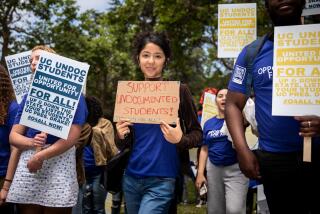Faculty accuse UC campuses of labor violations over pro-Palestinian protest crackdowns

Faculty across the state have accused the University of California system of carrying out a sweeping campaign to suppress pro-Palestinian speech and protests in violation of state labor law.
The Council of University of California Faculty Associations said UC administrators have threatened faculty for teaching about the history of the Israeli-Palestinian conflict and launched disciplinary proceedings against faculty for supporting on-campus student encampments as well as backing a strike by student academic workers this spring.
The faculty group made the allegations in a 581-page complaint filed Thursday with California’s Public Employment Relations Board, which oversees labor-management interaction for public employees in the state. The unfair labor practice charge was co-signed by faculty associations at seven UC campuses, including Los Angeles, Irvine, San Diego, Santa Cruz, Berkeley, Davis and San Francisco.
Faculty members gathered at UCLA midday Thursday to announce the charge. At the news conference, Constance Penley, president of the Council of UC Faculty Associations, described the university’s actions as a “relentless campaign to chill faculty’s exercise of their academic freedom and to deter them from teaching about the war in a way that does not align with the university’s position.”
Faculty have also been investigated for pro-Palestinian social media posts, arrested for exercising their free speech rights and were surveilled and intimidated by university representatives, the filing alleged.
The push from faculty highlights how, months after police cleared pro-Palestinian encampments at universities, the fallout has continued on various campuses, with university officials implementing new protest rules and students grappling with ongoing suspensions and holds on their records.
The faculty claims build on an earlier charge filed by the UCLA Faculty Assn. in the aftermath of attacks and mass arrests faced by students and faculty participating in an on-campus encampment in April and May. And they parallel similar allegations made by unions representing UC employees, including United Auto Workers Local 481, which represents student academic workers and the University Council-American Federation of Teachers, which represents 6,500 librarians and teaching faculty across the university system.
The various charges, filed earlier this year with the state labor board allege essentially that the university had failed to maintain safe working conditions, disregarded the free speech rights of its employees, and unlawfully made changes to working conditions in response to campus protests.
The university defends its course of action. In response to a request for comment, UC spokesperson Heather Hansen pointed to a university statement previously filed with the state labor board in response to the UCLA Faculty Assn.’s charge.
The university stated that while it “supports free speech and lawful protests,” it must also “ensure that all of its community members can safely continue to study, work, and exercise their rights, which is why it has in place policies that regulate the time, place, and manner for protest activities on its campuses.”
“The University has allowed — and continues to allow — lawful protesting activities surrounding the conflict in the Middle East. But when protests violate University policy or threaten the safety and security of others, the University has taken lawful action to end impermissible and unlawful behavior,” the university said.
The filing details instances of the university allegedly investigating and disciplining faculty.
Soon after the Oct. 7 attacks by Hamas on Israel, and the start of Israel’s bombing siege of Gaza, the university began sending emails to faculty threatening that they could be investigated and disciplined for teaching content outside the scope of their courses. In November, UC San Diego investigated two lecturers for teaching about the history of the Palestinian territories, the filing said. A UC Irvine faculty member was sent a “letter of warning” by the administration for holding a vote on whether to conduct class at the on-campus encampment, with optional attendance.
In another example cited, a medical school lecturer at UC San Francisco who delivered a talk in April about trauma-informed care at a health equity conference was barred from participating in future educational activities after she devoted some six minutes of a 50-minute course to discussing the topic as it related to Palestinians’ health challenges. A campus administrator informed the lecturer they had received complaints that her talk was “biased and antisemitic,” and took down an online video of the talk. The ban was eventually lifted, but the video remains offline.
The complaint says the university’s “harsh crackdown against professors for expressing pro-Palestinian viewpoints stands in stark contrast to its treatment of vocal pro-Israeli faculty.”
The university refused to initiate a formal disciplinary investigation into a pro-Israel faculty member at UC Irvine accused of harassing and physically intimidating an undergraduate student, although video footage was provided of the faculty member “cornering, physically intimidating, and interrogating a visibly scared student,” the filing said.
After an unfair labor practice charge is filed, the Public Employee Relations Board will review and evaluate the case, and decide whether to dismiss the charge or proceed with having parties negotiate a settlement. If no settlement is reached, the case would be scheduled for a formal hearing before an administrative law judge.
More to Read
Sign up for Essential California
The most important California stories and recommendations in your inbox every morning.
You may occasionally receive promotional content from the Los Angeles Times.











